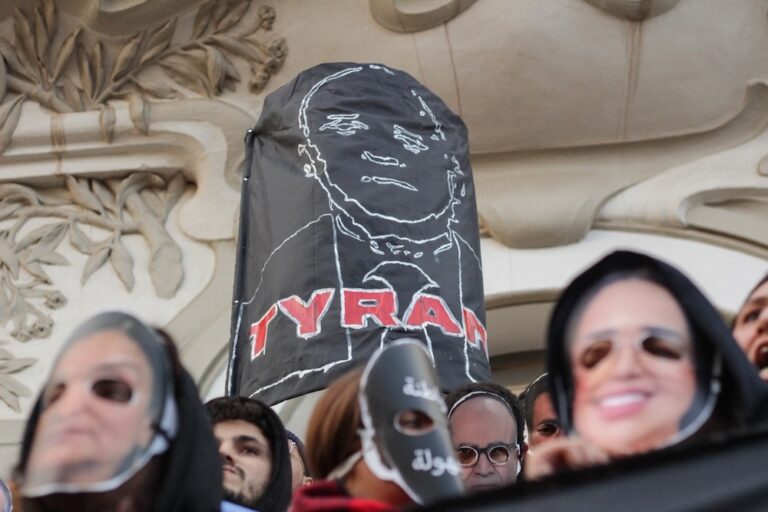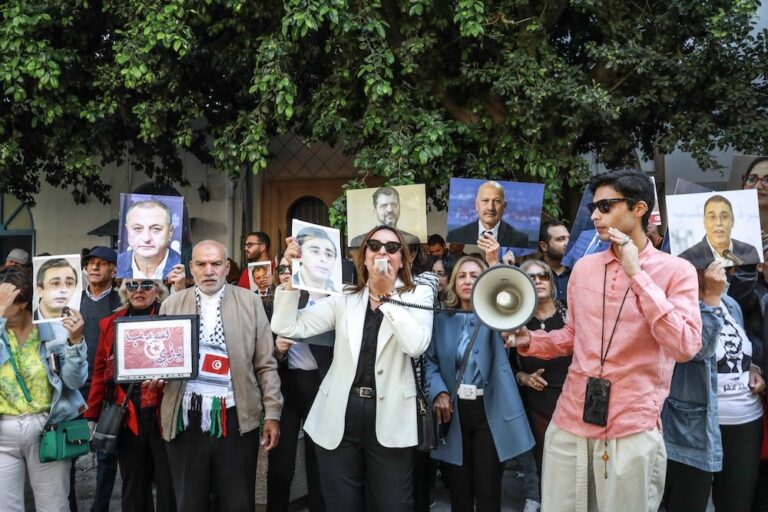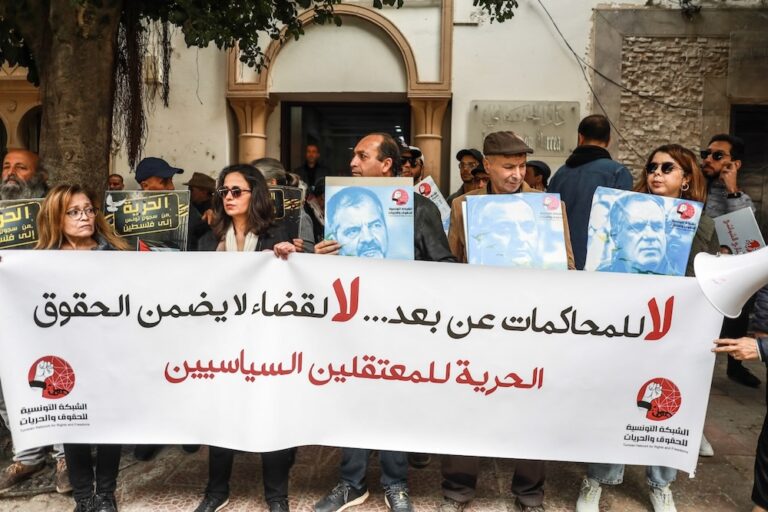(OLPEC/IFEX) – The following is a 3 May 2008 OLPEC press release: World Press Freedom Day Bleak picture for Tunisian media The Observatory for the Freedom of Press, Publishing and Creation (OLPEC) is celebrating World Press Freedom Day this year against the backdrop of a worsening free expression situation in Tunisia. In fact, despite intense […]
(OLPEC/IFEX) – The following is a 3 May 2008 OLPEC press release:
World Press Freedom Day
Bleak picture for Tunisian media
The Observatory for the Freedom of Press, Publishing and Creation (OLPEC) is celebrating World Press Freedom Day this year against the backdrop of a worsening free expression situation in Tunisia.
In fact, despite intense government rhetoric in its favour, free expression remains strictly controlled and censorship is on the rise.
And while the Tunisian Constitution guarantees freedom of expression, authorities seem to have little difficulty getting around the law to violate this right at every turn. The following are only a few illustrations:
– Journalist Slim Boukhdir has been languishing in prison since November 2007, ostensibly for refusing to present his identity card and for insulting a police officer. In fact, Boukhdir is paying the price for his reporting on corruption. Other journalists have been forced into exile to escape judicial harassment.
– Journalists working for the state media must endure heavy censorship, preventing them from practicing in accordance with professional standards. The situation prompted journalists from the government-owned newspaper “La Presse” to publish a collaborative report in March 2008 on the indiscriminate use of censorship within the paper, affecting even issues that seemed to represent little threat to national security.
– Authorities continue to prevent the independent press from publishing. In the last 20 years, not one new publication has received the green light from authorities. “Kalima” newspaper’s situation is a case in point. On 26 April 2008, the paper’s management, accompanied by their lawyer, Mohamed Abbou, presented their notice of registration to the Interior Ministry. The administration, however, refused to acknowledge receipt of the application, effectively preventing the “Kalima” team, for the fifth time since 1999, from receiving the authorisation needed to publish and sell the paper.
– Despite the abolishment of legal submission requirements, which had previously been manipulated by authorities for preventive censorship purposes, opposition newspapers such as “Mouatinoun” and “Al Mawkif” continue to suffer fiscal strangulation. They have no access to state subsidies ostensibly available to the press and are denied government advertising revenues. Meanwhile, potential private sector advertisers keep their distance, fearing government retaliation. Distribution is thwarted by a battery of insidious measures clearly aimed at curtailing circulation and offending issues are often removed from newsstands without any legal basis. The situation prompted two senior editors at “Al Mawkif”, Rachid Khechana and Mongi Ellouz, to begin a hunger strike on 26 April to protest the harassment.
– Meanwhile, “private” newspapers such as “Al Hadeth”, “Assarih”, “Achourouq” and “l’Observateur” – all of which are run by the government’s “Special Services” wing – continue to sully the media landscape by spreading misinformation and using their pages to attack human rights advocates and dissidents, discrediting and libelling them with complete impunity. More disturbing still, two of the appointed mudslingers, A. Jeridi and A. Sghaier, were recently assigned new newspapers as a reward for their efforts.
– The government continues to monopolise the broadcasting scene. So-called “independent” media outlets are in fact only a private sector version of the state media, with private radio and television stations assigned only to those closely-aligned to circles of power. Their licences are granted under a veil of secrecy outside of the existing regulatory framework, but they serve as a necessary stand-in for real media pluralism.
– Internet use continues to be strictly monitored and information systematically filtered. Access to a number of news sites, including http://www.tunisnews.com , http://www.kalimatunisie.com , http://tunisiawatch.rsfblog.org , http://www.pdpinfo.org , http://www.fdtl.org and alhiwar.net, as well as to the websites of human rights NGOs such as IFEX ( http://ifex.org ), FIDH ( http://www.fidh.org ), OMCT ( http://www.omct.org ), RSF ( http:///www.rsf.org ) and Amnesty International ( http://www.amnesty.org ) remains blocked. New and increasingly sophisticated techniques are being used to strengthen control over electronic messaging, while journalists and human rights advocates find their inboxes flooded by pornographic pop-ups or their Internet connections cut altogether by Tunisia Telecom, the state-run service provider, despite having paid their bill.
Against this backdrop, OLPEC issues the following recommendations to restore this damaged sector:
1. Free journalist Slim Boukhdhir and cease the judicial harassment of Mohamed Fourati and all journalists facing similar harassment for practicing their profession.
2. Abolish corporal punishment for press infractions and eliminate all clauses restricting freedom of expression and of the press from the press and penal codes, in accordance with Article 19 of the International Covenant on Civil and Political Rights.
3. Guarantee access to information and protection of sources for all journalists without restriction.
4. Lift arbitrary administrative restrictions on publishing for independent media outlets, by accepting notices of registration by post as sufficient for subscription to the official gazette.
5. Guarantee real press pluralism by granting equal rights and access to all publications, including to the opposition press, in particular with respect to government advertising, subsidies and distribution.
6. Guarantee real broadcasting pluralism by enacting a transparent legal framework to regulate the granting of broadcast licences.
7. Dissolve the government’s external communications agency (Agence tunisienne de communication extérieure, ACTE), which recalls the propaganda ministries of another era and is a blot on the country’s image and economy.
8. Guarantee access to justice and due diligence within the legal system for all citizens, including journalists and rights activists.
9. Ensure the conditions necessary for the public broadcast and print media to fulfill their true public service role, including lifting all forms of censorship currently applied to journalists at state-owned media outlets.
10. Eliminate all barriers to electronic messaging and all forms of illegal Internet censorship, including the blocking of access to news sites and blogs.
Sihem Bensedrine
Secretary General
OLPEC


